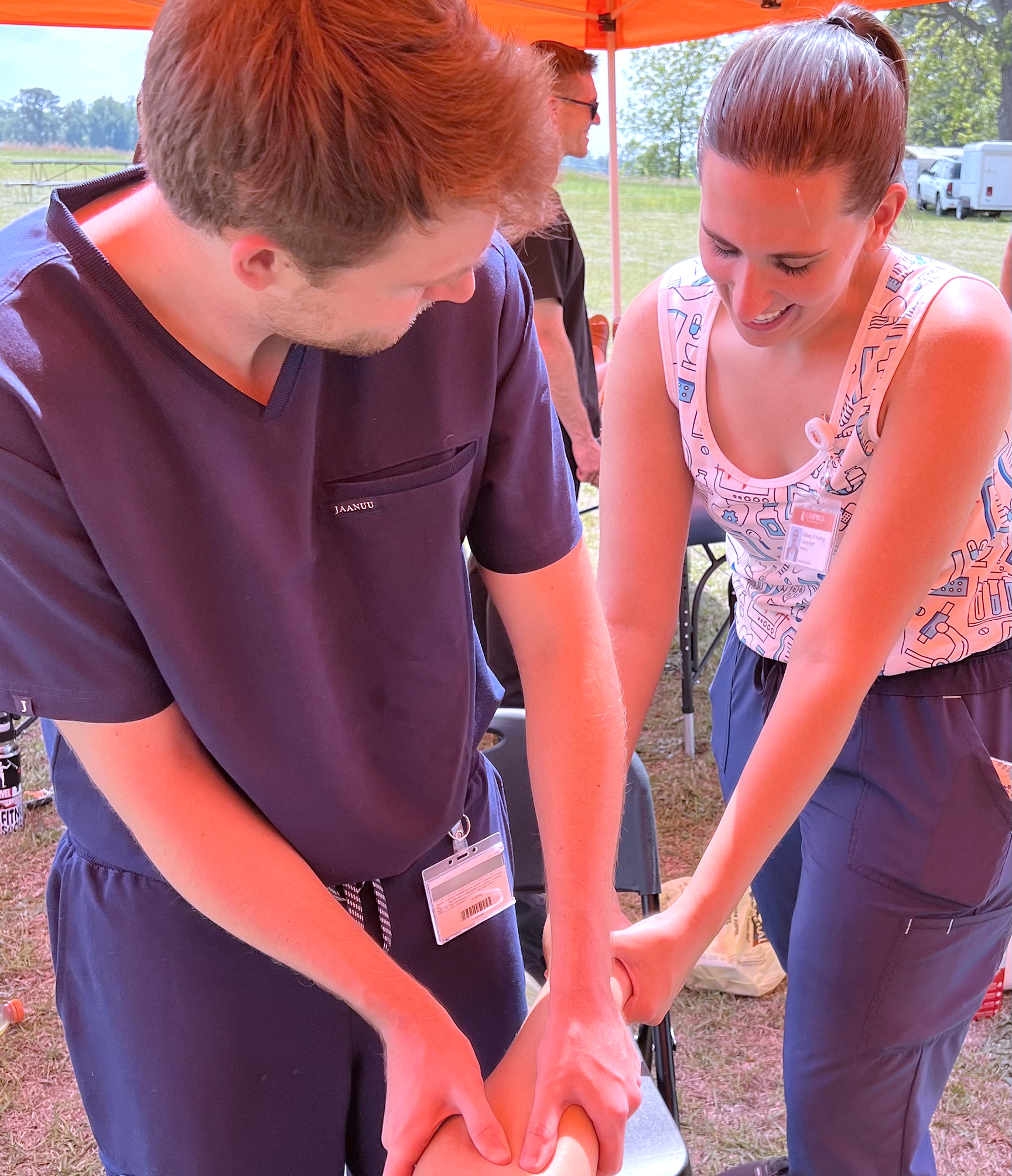CLINTON — A team of student volunteers from the Jerry M. Wallace School of Osteopathic Medicine, the College of Pharmacy & Health Sciences and the School of Education & Human Sciences provided free manipulative medicine treatments, counseling and other health-related services at the Spring Wellness Outreach event held in April.

The day was part of a series of outreach events hosted by Campbell University to serve the nearby Coharie Tribe, one of eight state-recognized American Indian tribes in North Carolina with more than 3,000 members. Medicine and public health students and faculty most recently hosted a COVID-19 education program for the tribe back in January.
The April 29 program served roughly 40 patients, many of whom had never heard the term “osteopathic” before their screening, according to medical student Bethany Harting.
“This served as their introduction to the field,” she said. “They loved the results and the experience, and we have been asked to return in the future.”
Dr. Amy Hinkelman, who has volunteered for several of the outreach programs in Sampson County, called the Spring Wellness event an “all-hands-on-deck interprofessional collaboration” between Campbell programs.
“It took a village of faculty and student volunteers every step of the way, and as a result, it was a beautiful success and testament to what we can do when we work together to serve our community and fulfill Campbell’s mission,” Hinkelman said. “It has been an immense joy to collaborate with our tribal communities over the past few years, learning from them and how we can continue this work to support the health and wellbeing of our local communities — our neighbors and, now, our friends.”
Hinkelman said med students utilized what they’ve learned to provide pain relief through manipulative, hands-on care. Students were busy the entire day, she said, as patients passed on positive reviews to others after their treatment. The group has been invited to the Coharie’s annual Pow Wow, often held in September. Students were supervised by Hinkelman and Dr. Robin King-Thiele, associate dean for postgraduate affairs for the med school, and Harting oversaw the osteopathic manipulative treatment tent.
Public Health Chair Dr. David Tillman has also developed a solid relationship with the Coharie over the past two-plus years. He called the health fair a “fabulous event” that represents a “pivot point in our health-related projects with the Coharie tribal community.
 “We began this work in the midst of the pandemic to respond to the urgent need to provide trustworthy information regarding the COVID vaccine,” he said. “With this health fair, which focused on chronic disease prevention, behavioral health and wellness, we enacted our commitment to serving as partners in health over the long-term, not just during the pandemic crisis. Even more, we demonstrated the potential of our powers combined, by linking so many programs across the University.”
“We began this work in the midst of the pandemic to respond to the urgent need to provide trustworthy information regarding the COVID vaccine,” he said. “With this health fair, which focused on chronic disease prevention, behavioral health and wellness, we enacted our commitment to serving as partners in health over the long-term, not just during the pandemic crisis. Even more, we demonstrated the potential of our powers combined, by linking so many programs across the University.”
These events, in addition to the leadership program to be launched by the Lundy-Fetterman School of Business and the School of Education & Human Sciences this summer, show that Campbell’s commitment to the Coharie and other American Indian tribes is only getting stronger.
“On both ends of the partnership, I think we are learning so much from each other,” Tillman said. “I look forward to cultivating the Coharie-Campbell connection for a long, long time.”
Camellia Webb, field director for Campbell’s Social Work department, said having Social Work present was important, as it’s a profession that “emphasizes that people, families and communities cannot be strong and productive unless the basic needs of its members are met.”
Campbell’s Social Work students, she said, demonstrated these tenants at the Spring Wellness Outreach event.
“Our students provided education on positive body imaging, healthy food choices and foster care needs among Native American families,” she said. “The students provided engaging and creative education materials, conversations and one our very own debuted her singing talents. I am very proud of the impact they made within the community.”

